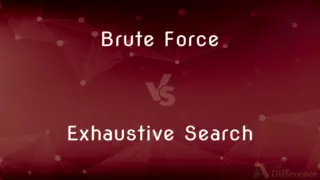Would Have vs. Could Have — What's the Difference?
By Tayyaba Rehman — Published on October 7, 2023
Would Have" often conveys a missed obligation or unfulfilled intention, while "Could Have" indicates a missed possibility or opportunity due to certain circumstances.

Difference Between Would Have and Could Have
Table of Contents
ADVERTISEMENT
Key Differences
"Would Have" predominantly signals a condition relating to an unfulfilled past event or action, providing a nuanced lens into what was initially intended or obliged to happen, in contrast to "Could Have," which typically communicates an unrealized possibility or choice stemming from past circumstances.
"Would Have" threads through sentences to navigate through scenarios of intended actions that remained incomplete, thereby distinctly engaging with scenarios of unfulfilled intentions or plans, while "Could Have" resonates with a tone of missed opportunities and unrealized potentials, emerging from perhaps, a lack of capability or external barriers.
The essence of "Would Have" delicately intertwines with the thematic undertones of regret or disappointment about something unachieved, whereas "Could Have" perhaps, leans slightly towards a realm of lamentation for what might have been possible under different conditions.
By employing "Would Have," sentences echo with resonances of unrealized actions or results emerging from certain intentions or obligations, while utilizing "Could Have," a speaker or writer navigates through past scenarios with a perspective that highlights absent opportunities or possibilities.
Comparison Chart
Typical Usage
Unfulfilled intention or obligation
Missed possibility or opportunity
ADVERTISEMENT
Connotation
Often implies a degree of commitment
Implies a possibility, not a commitment
Related Emotion
May imply regret for an unfulfilled intention
Suggests a missed opportunity
Example Situation
Missed appointment due to intent to attend
Missed appointment due to possible attendance
Grammatical Function
Modal verb expressing past unfulfilled intent
Modal verb expressing past possible action
Compare with Definitions
Would Have
"Would Have" sometimes conveys hypothetical past scenarios.
It would have been fun to go to the beach.
Could Have
"Could Have" is often used in speculative scenarios.
If he tried, he could have succeeded.
Would Have
"Would Have" is often used in third conditional sentences.
If she had known, she would have come.
Could Have
"Could Have" can suggest absence due to a certain reason.
She could have been a doctor but chose teaching.
Would Have
"Would Have" is used to describe unmet intentions.
She would have visited, but she was sick.
Could Have
"Could Have" denotes a possibility that was not realized.
They could have won the match.
Would Have
"Would Have" can express unfulfilled obligations.
He would have worked if it was mandatory.
Could Have
"Could Have" also reflects on unrealized potentials.
I could have been a contender in the race.
Would Have
"Would Have" might indicate regret over past non-actions.
They would have helped if they knew.
Could Have
"Could Have" sometimes highlights missed opportunities.
You could have told me earlier.
Common Curiosities
What does "Could Have" typically convey?
"Could Have" generally conveys missed possibilities or opportunities from the past.
When do we use "Would Have" in English?
"Would Have" is used to describe unfulfilled intentions or conditions in the past.
How is "Could Have" employed in expressing regret?
"Could Have" can denote regret about missed opportunities or unused potentials.
Can "Would Have" imply a sense of regret?
Yes, "Would Have" can express regret over unfulfilled intentions or plans.
Can "Could Have" signify a lack of past capability?
Yes, "Could Have" might imply a lack of resources or ability in the past.
Does "Could Have" engage in hypothetical discourse?
Yes, "Could Have" often navigates through hypothetical past scenarios.
Is "Would Have" used in everyday conversational English?
Yes, "Would Have" is commonly used in conversational English to discuss “what could have been”.
Can "Could Have" indicate a different choice was possible?
Yes, "Could Have" might suggest that an alternative action or decision was possible.
Does "Could Have" explore scenarios in speculative situations?
Yes, "Could Have" can explore “what might have been” in speculative situations.
How does "Would Have" function in conditional sentences?
"Would Have" is often used in third conditionals to discuss unrealized past scenarios.
How does "Would Have" engage with narratives of the past?
"Would Have" reflects on past scenarios with a lens of unfulfilled intentions or plans.
How might "Could Have" navigate through lost opportunities?
"Could Have" explores past possibilities or opportunities that were not realized or taken.
Can "Would Have" be contracted in informal writing?
Yes, "Would Have" is often contracted to "would’ve" in informal contexts.
How does "Would Have" express dissatisfaction?
"Would Have" might articulate dissatisfaction through unfulfilled past intentions.
Can "Would Have" and "Could Have" be used interchangeably?
Not always, as they convey different nuances about past events or possibilities.
Share Your Discovery

Previous Comparison
Rice vs. Risotto
Next Comparison
Brute Force vs. Exhaustive SearchAuthor Spotlight
Written by
Tayyaba RehmanTayyaba Rehman is a distinguished writer, currently serving as a primary contributor to askdifference.com. As a researcher in semantics and etymology, Tayyaba's passion for the complexity of languages and their distinctions has found a perfect home on the platform. Tayyaba delves into the intricacies of language, distinguishing between commonly confused words and phrases, thereby providing clarity for readers worldwide.












































